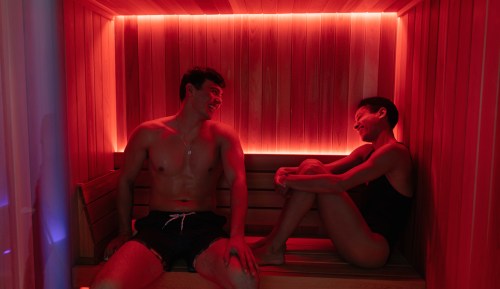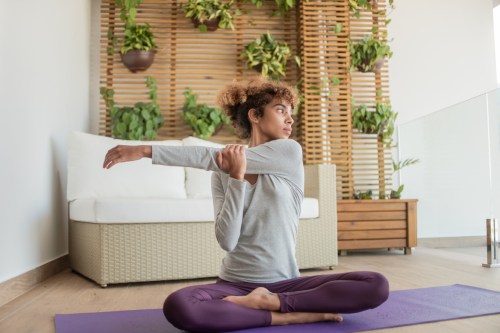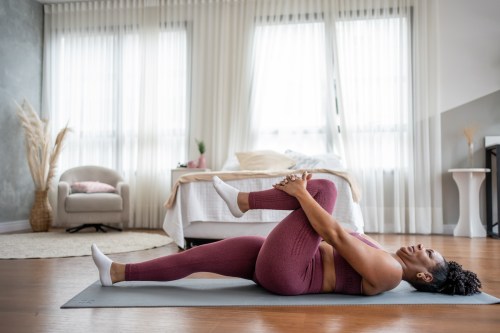Exactly What It Means If Your Butt Keeps Falling Asleep When You Sit Down
Finding yourself wondering, "Why is my butt falling asleep while sitting?" Pros explain what, exactly, is going on.

Picture this: You’re in the middle of your last email of the day, and you feel something weird. Your butt starts…tingling? Nope. Your butt is, in fact, asleep. Take a deep breath—you’re far from alone. Referred to as gluteal amnesia, dead butt syndrome, or “sleeping booty” (as San Diego-based trainer Caroline Jordan calls it), this gluteus nap is pretty darn common. So if you’re wondering why your butt is falling asleep, injury prevention specialist and trainer Liz Letchford, PhD, ATC, is about to tell us why ants are crawling in your pants.
Experts in This Article
Caroline Jordan, ACE, is a certified fitness instructor who has taught at Equinox, among other places.
injury prevention researcher, sports medicine specialist, and fitness trainer
Aside from the obvious culprit of spending too much time in your desk chair, Dr. Letchford says that there are three other major reasons why you may be experiencing gluteal amnesia. Ahead, she breaks down each one and offers her best tips for keeping your behind awake as 9 a.m. fades into noon then 4 p.m. Remember, though: If your butt sleeping troubles persist, it’s a good idea to consult a specialist. A visit with a medical professional can help you determine whether you just need to listen to your wearable and stand up or you need more professional opinions for your booty and spine. That said, let’s dive in.
Why is my butt falling asleep?
1. Poor (prolonged) seated posture
If your butt muscles tend to drift off to sleep throughout the workday, Dr. Letchford says your posture is the very first thing to check. “You could be overarching or over-rounding your lower back while seated, and if you stay in this position long enough without engaging your core to support your spine, you may be compressing a disc in your low back,” says Dr. Letchford. “Try shifting positions periodically to adjust the pressure on your spine.” You could even set a reminder on your phone that sounds off to tell you it’s time to check in with your body and how you feel.
2. Irritated sciatic nerves
“The sciatic nerves are two are nerves that run right down the middle of your glutes. And, like any other nerve, when pressure is applied for a long amount of time, you can experience paresthesia, aka tingling or numbness,” says Dr. Letchford. “This can be exacerbated if you tend to sit for long periods of time with items like a wallet in your back pocket [or on a bad chair in a weird position], leading to excess pressure on the sciatic nerve.” This sciatic nerve irritation is also known as “piriformis syndrome” or “deep gluteal syndrome.” Since it’s a bit more serious, she recommends seeking a medical evaluation from a professional and/or physical therapist.
3. Cluneal nerve neuralgia
This sounds scary and complicated, but it’s actually pretty straightforward. Cluneal nerve neuralgia is the result of sitting on something too hard, particularly if you have a bonier butt. “The cluneal nerves supply sensation to the buttocks, and can be compressed and irritated by sitting on a hard surface, especially if you don’t necessarily have a significant amount of gluteal muscle to cushion the bone,” says Dr. Letchford. “Try sitting on a softer surface, or trying a pressure relief cushion to alleviate symptoms.”
What can I do to wake my glutes up again?
1. Try glute activation exercises
If you realize that your butt has fallen asleep and you’re not in pain (this is important), Jordan recommends some at-home glute exercises you can do right now—sans equipment. “This gluteal activation is to help your booty ‘wake back up,'” says Jordan. She recommends a mix of hip bridging and bird dogs to help get those muscles firing again so that they can support your low back and prevent pain.
2. Move around
Obviously, one of the easiest remedies is to ensure you’re getting up enough throughout the day and breaking up those prolonged periods of sedentary behavior. It may not solve all your problems, but it could help prevent some of the aforementioned nerve issues.
3. Get a better chair and adjust your posture
From Dr. Letchford’s note, part of what contributes to these issues isn’t just being sedentary, but the specifics of your seated position. Free your back pockets of anything that may cause nerve pressure, ensure you’re in a chair that supports good posture and has adequate cushioning and work with a physical therapist or trainer to ensure your seated posture isn’t compressing a disc.
Get those glutes activated by following along with the workout below.
Oh hi! You look like someone who loves free workouts, discounts for cutting-edge wellness brands, and exclusive Well+Good content. Sign up for Well+, our online community of wellness insiders, and unlock your rewards instantly.
Sign Up for Our Daily Newsletter
Get all the latest in wellness, trends, food, fitness, beauty, and more delivered right to your inbox.
Got it, you've been added to our email list.










